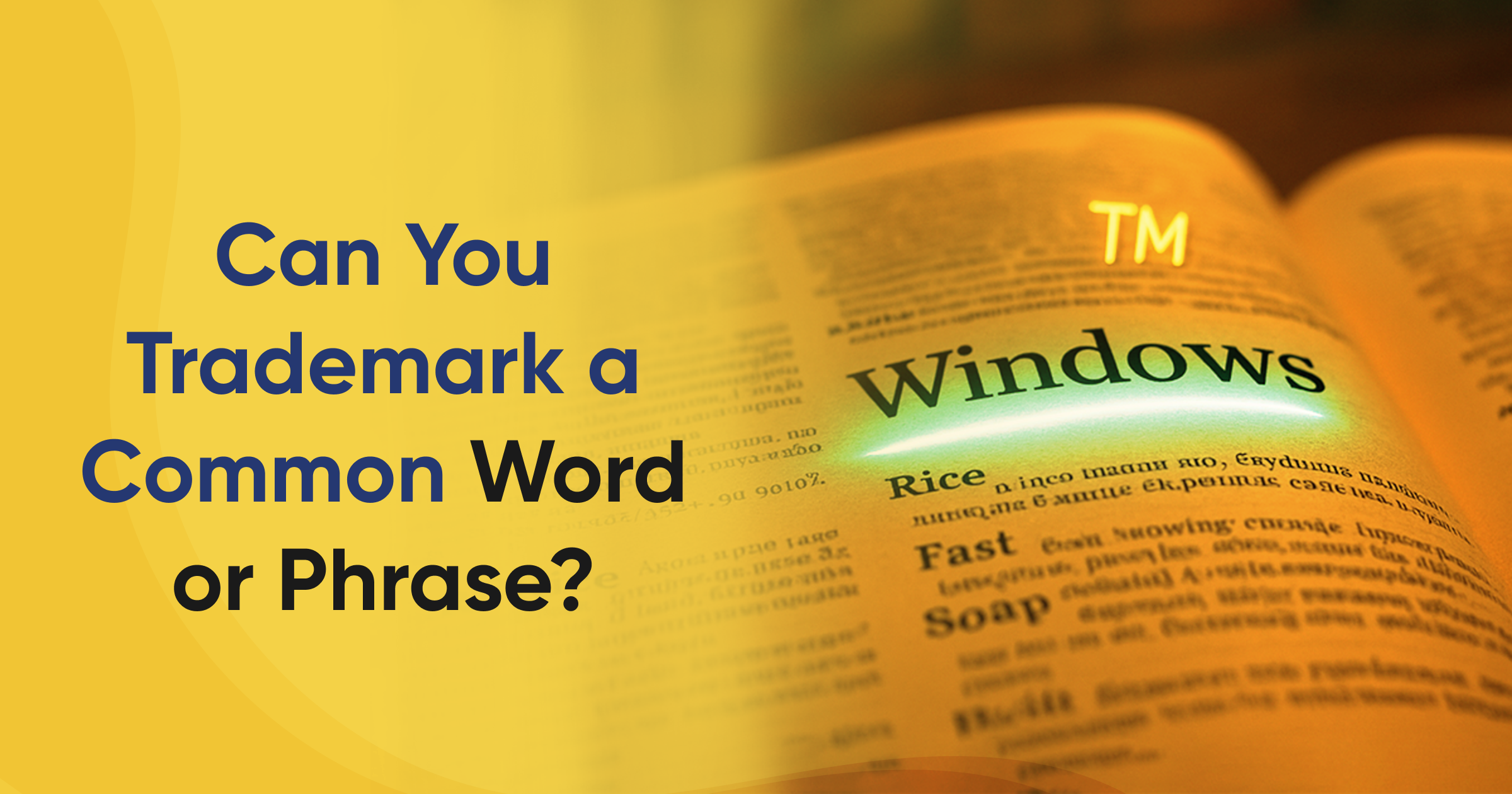We speak in common words. We use simple phrases every day. But can someone lock them away with a trademark? The short answer: usually no. But sometimes yes. The law allows exceptions. And those exceptions can change the fate of a brand.
Why the law says “No”
A trademark is meant to stand apart. It’s not just a word. It’s a signal. It tells people: this product comes from here, and nowhere else.
Now imagine trying to trademark “Rice” for rice. Or “Fast” for courier services. The law says no. Why? Because these words are open to all. Everyone in that trade needs them. Blocking them would choke competition. The Indian Trade Marks Act, 1999, puts this in black and white. Section 9(1)(b) rejects marks that describe the kind, quality, or other features of goods. Section 9(1)(c) bars words that have become customary in trade. In plain words: if the term is too common, it cannot serve as a brand.
Generic or descriptive? Know the difference
Generic words are the names of things. “Computer” for computers. “Soap” for soap. Nobody can own them. Descriptive words explain features. “Fresh” for fruits. “Strong” for cement. Again, weak marks. Both categories usually fail at the registry. They don’t tell consumers who made the product. They only tell what the product is.
The twist: when common words win
Now comes the twist. Some words, through long and exclusive use, stop being “just words.” They start pointing to one business alone. This is called secondary meaning. Think of “Windows.” At first, it meant glass openings. Today, most people think of Microsoft. The word crossed over. Think of “Google.” It began as a quirky play on “googol.” Now, it means the search engine itself.
In India, too, courts have accepted this principle. The Supreme Court in Godfrey Phillips India Ltd. v. Girnar Food and Beverages Pvt. Ltd. held that the phrase “Super Cup” had gained distinctiveness for tea. The words may have been common, but the market recognized them as pointing to one source. This shows that the law is not rigid. If you build recognition, you can win protection.
When courts stepped in real cases!
Indian courts have wrestled with this balance often.
- J.L. Mehta v. Registrar of Trademarks - The court allowed descriptive words if applied in a different class of goods. Meaning: context matters.
- Godfrey Phillips India Ltd. v. Girnar Food and Beverages Pvt. Ltd. - Accepted secondary meaning for “Super Cup.” Proof of market recognition was key.
- Lal Babu Priyadarshi v. Amritpal Singh - Drew limits. Religious texts like “Ramayana” cannot be monopolized. Section 9(2) bars marks that hurt public or religious sentiment.
- Sulekha case - The word “Sulekha” means good handwriting. Still, it was registered for fountain pens. Why? Because in that context, it worked as a source identifier.
These decisions show one thing: the same word can pass or fail depending on use, industry, and consumer perception.
Proving it in black and white
It’s not enough to claim distinctiveness. You must prove it. Evidence is the key. The Registrar and courts look for:
Sales data
Numbers speak louder than words. Show records of steady sales under the mark. The bigger the numbers, the stronger the case. If people keep buying under that name, it proves recognition in the market. Sudden spikes won’t cut it. Long-term patterns matter.
Advertising spend
Money spent on ads is proof of effort. If you’ve invested heavily in newspapers, TV, billboards, or online campaigns, it shows you’ve pushed the mark into the public eye. Courts look at the scale and reach. Was it local? National? Did it run for years? Big spend plus wide reach builds credibility.
Market surveys
Surveys are direct proof of consumer perception. Independent agencies ask people: when you hear this word, what brand comes to mind? If most say your business, it’s powerful evidence. Courts value surveys when they’re unbiased, large-scale, and scientifically done. A few testimonials won’t be enough.
Longevity of use
Time builds trust. If you’ve used the mark exclusively for years, it shows consistency. A decade of use weighs heavily. The longer you stick with the word, the more likely people connect it only with you. Courts see old records, packaging, invoices, and contracts as proof.
Other supporting evidence
Sometimes, smaller pieces matter too. Media coverage. Awards under the brand name. Recognition by trade associations. Even online presence - social media reach, website traffic - can add weight. Without this, your mark is just another word in the dictionary.
Why not everyone can own “Milk”
Trademarks are monopolies. They give you exclusive rights. If common words were locked up, no one else could use them in trade. Imagine if someone trademarked “Milk” for dairy. Others would be silenced. That’s why the law guards the boundary. It protects distinctiveness but keeps language free. Exclusivity is earned, not claimed!
Words that break the rule
Not all words get rejected. Some win because they are used in unusual ways. Arbitrary marks use common words in unrelated fields - like “Apple” for computers or “Lotus” for software. They stand out at once. Fanciful marks are invented words like “Xerox” or “Kodak.” They mean nothing else, so they are strong from day one. Suggestive marks hint without describing. “Netflix” suggests movies on the net but doesn’t spell it out. These kinds of marks are safer. They skip the traps of generic and descriptive words.
Indian law in practice
The Trade Marks Act works on balance. On one side, it pushes for uniqueness. On the other, it respects public use of language.
Section 9 (absolute grounds) - Rejects marks that are generic, descriptive, or customary.
Section 11 (relative grounds) - Rejects marks that clash with earlier marks, even if common.
Section 9(2) - Bars marks that deceive, offend, or misuse national and religious symbols.
These provisions stop abuse. They ensure trademarks protect brands without blocking common speech.
So, what should businesses keep in mind?
- Avoid weak marks. Don’t start with words everyone needs. “Good,” “Best,” “Fresh” - all weak.
- Aim for creativity. Invent words. Use arbitrary choices. They are stronger and safer.
- If using common words, build evidence. Invest in marketing. Make the word yours in the public mind.
- Be industry-specific. What is generic in one field may be distinctive in another. Context matters.
- Do a trademark search. Always check if someone else already claimed a similar word.
Filing blindly can waste time and money.
When words stop being words and start being brands
A trademark is more than a legal tool. Its identity. It builds trust. It attracts customers. If your brand rests on a common word, you must go the extra mile to prove distinctiveness. Trademark battles are not just about rights. They are about market position. Winning or losing one can change your brand’s value overnight.
Trademark law looks simple on paper. In practice, it’s full of twists. Proving secondary meaning takes evidence. Defending your mark takes skill. That’s where experts matter. At Trademarkia, our experienced trademark lawyers work on this every day. They know the law. They know the process. And they know how to build the proof that makes a mark stand. If you’re thinking of trademarking, don’t do it alone. Let our team guide you. We’ll help you protect your brand, so you can focus on growing it.

